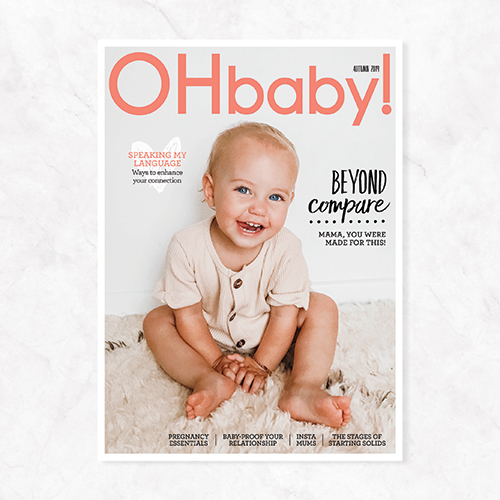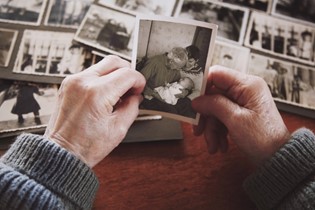Gentle words of wisdom for parents of newborns

Dorothy Waide has been supporting parents for decades. Here she offers her gentle words of wisdom to the mamas and papas of newborns.
Becoming a new parent may be one of life’s most wonderful experiences – but it may also be the most daunting. Our babies don’t come with instruction books, and all babies and all parents are different. New parents can be overwhelmed with all the information out there in the market place, but it’s important to remember that most ‘helpful tips’ are merely a guide. You need to filter through them and find what works for you. There are different approaches to baby care, but my best advice is to parent how you want to parent, and listen to your gut rather than take on advice that doesn’t sit with you.
We’re all so busy these days, and we’re forgetting the art of simply stopping to smell the roses. I strongly encourage new parents to press pause on all the busy and allow yourselves time to get to know your baby. Cocoon yourself away from the world and enjoy those first few weeks. We recently had a good example when Prime Minister Jacinda Ardern gave birth to her baby and we didn’t see her for six weeks. It takes a minimum of six weeks to establish feeding and understand the needs of your little one, not to mention the needs of both parents and how to best support everyone during this season.
GETTING INTO A ROUTINE
One of the most common questions I get from parents is “When, and how, do I put my baby into a routine?”. It was previously taught that newborns needed feeding every three to four hours, but I think this has caused some confusion around routines for babies. In my experience, I’ve observed that, rather than clock-watching, it is the sleeping rhythm (cycle) that more accurately dictates how often your baby will feed.
|
A typical routine for a baby under 12 weeks old is: ☙ Baby wakes ☙ Baby feeds ☙ Baby is changed and burped ☙ Baby may feed again ☙ Baby sleeps |
A good guideline to work from is to add baby’s wake cycle and their sleep cycle together to get their feeding rhythm in the early weeks. For example, if your baby is up for 45 minutes and sleeps for 1¼ hours, your baby will feed every 2 hours, but if your baby is up for 45 minutes and sleeps for 1½ hours, then your baby will feed every 2¼ hours. This is not snack feeding, especially in the early weeks, as you are feeding to your baby’s requirements.
Remember, you cannot spoil a baby under 12 weeks old. At this age, a baby isn’t able to manipulate you. In fact, you can’t spoil a baby in general. As crying is a baby’s survival instinct and their only way of communicating, it’s important you respond to your baby when they cry. Stop, listen and act. Where are you when your baby is crying? What are you doing for your baby? Caring for babies takes TACT – time, acceptance, consistency and touch/presence.
SETTLING YOUR BABY
Babies don’t have the ability to self-settle (self-soothe) or resettle themselves until between 12 and 16 weeks. I find it is so much easier to settle babies in my arms, rather than in a cot/bassinet. When settling in arms, try and remember not to do anything movement-wise that you can’t replicate in a cot. A lot of the advice out there suggests rocking, walking, swinging, bouncing on a Swiss ball or other large movements to get your baby to sleep. However, if you stop and do movement (like gentle cupping or patting) on your baby’s body instead, while keeping your body still like a mattress, it is then easier to transfer your baby to the cot.
If you feel there is something not quite right with your baby, seek professional help and continue to do so until you find the right person who will actually stop and listen.
|
ADOPT AN 'IT'S OKAY' MANTRA It’s okay: ☙ If the house is a mess ☙ To be in your pyjamas at 3pm – or all day ☙ To stipulate visiting times ☙ To turn away visitors if you’re not feeling up to it ☙ To say “No” to waking your sleeping baby, just so visitors can have a peek ☙ To ask house guests to wait on you, rather than the other way around ☙ To request visitors use hand sanitiser or wash their hands before holding your baby – your baby is a person not a doll! |
THOSE TRYING DAYS, AND NEVER-ENDING NIGHTS
It is so important for sleep-deprived parents to look after themselves. When making decisions on how you’re going to care for your baby, try to be consistent – think it through and follow it through. Work within your limits – not those of others. It’s about matching your needs with your baby’s needs, assessing your challenges with an open and objective mind, and remembering not to be hard on yourself when you get things wrong – mistakes are how we learn.

Staying positive isn’t easy when you’re overwhelmed, but take your time and, as much as possible, stay calm and be patient. Try not to compare your parenting (or your baby) with your friends’ or coffee group. It’s also imperative you don’t feel the need to present yourself as a perfect parent – they don’t exist. And there’s no such thing as a perfect baby either. Ask for help, rather than wait for offers. And don’t feel duty-bound to arrangements – it’s okay to say no and cut yourself some slack.
Looking after your partner is also important, so check in with each other! There is plenty of advice out there specifically for dads too, check out our dad section for some great articles.
CUPPA AND A COOKIE
A good balanced diet and plenty of water are obviously crucial, but breastfeeding mothers shouldn’t overlook supplements. At this demanding time you need to boost your diet with additional support. I recommend multivitamins, omega 3s, probiotics and breastfeeding teas – Artemis is my favourite but there are many great brands out there. I also suggest breastfeeding cookies – there are lots of nutritious and delicious options available, and you can also make your own. For mothers who are struggling with milk supply, I recommend fenugreek. Also, magnesium, calcium and vitamin D are great for mums with post-natal anxiety – check with a qualified professional to guide you with the correct formula to take.
POINTS TO PONDER
There is no right or wrong way of caring for a baby (within reason), however there are certainly harder and easier ways.
We are all aware of how important food is for a baby’s survival; however, sleep is another vital nutrient. Food and sleep go hand in hand – without food babies won’t sleep well, and without sleep they won’t feed well.
Life isn’t 100% predictable so you can’t plan for 100% consistency in everything you do. It’s perfectly acceptable to aim for 80% consistency in the way you care for your baby.
Work within your own limits, not those of others. This is your time to learn to parent and, as with learning anything new, you will make mistakes. As I’ve said, we learn most effectively by making mistakes – so don’t be too hard on yourself.
Try not to parent simply by following what other people tell you to do. The reality is most people can’t remember their own experiences with a newborn that clearly – many tend to think they had perfect babies! You are your baby’s best expert – professionals are the people who support you in your journey.

| HELP IS AT HAND | |
| Nutricia Careline | 0800 438 500 |
| Mothers Milk NZ Charitable Trust | facebook.com/mothersmilknz |
| Bellyful | bellyful.org.nz |
| Crying over spilt milk | cryingoverspiltmilk.co.nz |
| Depression Help Line | 0800 111 757 |
| Plunket | 0800 933 922 |
| For help with tongue ties | tonguetienz.weebly.com |
|
Dorothy started her career training as a Karitane Mothercraft nurse in New Zealand in the 1970s and is one of NZ’s leading baby-sleep experts. Dorothy is the author of You Simply Can’t Spoil a Newborn and is currently producing the audiobook, as well as working on her next book, which covers baby care from 12 weeks to toddlerhood. You can find her at facebook.com/BabyWithin and babyhelp.co.nz. |

AS FEATURED IN ISSUE 45 OF OHbaby! MAGAZINE. CHECK OUT OTHER ARTICLES IN THIS ISSUE BELOW

















